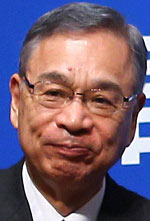Japan is considering sending "China School" politicians - those in the foreign ministry who know Chinese well or have learned the Chinese language - to China following the death of its ambassador-designate Shinichi Nishimiya.
|
 Yuji Miyamoto is favored by many to become the next Japanese ambassador to China |
The move will send a positive signal to improve strained China-Japan ties, analysts said on Tuesday.
Sending "China School" politicians will signal Japan's attempt to improve bilateral ties, said Shen Shishun, an expert on Asia-Pacific studies at Haikou College of Economics in Hainan province.
Sending those who have a strong stance against China will "add insult to injury" in Sino-Japanese relations. Both China and Japan are trying to avoid the escalation of tensions, he said.
Nishimiya, who was due to replace the current Japanese Ambassador to China Uichiro Niwa, died on Sept 16.
Potential successors will be selected from those with experience in the Japanese Foreign Ministry, according to a ministry source.
Several within the Japanese government are now pushing for Yuji Miyamoto, a former ambassador to China, to take up the position again, according to the Kyodo News Agency.
Miyamoto - who helped to improve Sino-Japanese ties after former Japanese prime minister Junichiro Koizumi visited the Yasukuni Shrine in 2007, harming bilateral relations - is seen as the best choice, it said.
Born in 1946, Miyamoto entered the Japanese Foreign Ministry in 1969 after graduating from the Department of Law at Kyoto University.
From 1990 to 1991, he served as the China division chief of the ministry's Asia Bureau and from 2006 to 2010 he was the ambassador extraordinary and plenipotentiary to China.
Miyamoto has abundant experience in dealing with China-related affairs. He has a good relationship with all circles in China, said Zhou Yongsheng, an expert on Japanese studies at China Foreign Affairs University, who knows Miyamoto well.
According to Zhou, Miyamoto is interested in Chinese culture and history, especially the Ming Dynasty (1368-1644).
He used to train Japanese diplomats who were going to work in China, and he is one of the most China-friendly politicians in Japan, Zhou said.
Miyamoto is an active participant in the Beijing-Tokyo Forum, an annual large-scale international symposium on China-Japan relations jointly sponsored by China Daily and the Japanese nonprofit organization Genron.
He said he does not agree that a fast-developing China is a threat to Japan, and he sees Sino-Japanese economic cooperation as a good basis for bilateral relations.
Since it is uncommon for a diplomat to serve in the same post twice in the same country, there are also other candidates on the shortlist. Among them is Shigekazu Sato, 62, Japan's ambassador to Thailand.
After graduating from the Law Faculty of Tokyo University, Sato joined the Japanese Foreign Ministry in 1974 and served as the first secretary of the Japanese embassy in China in 1986.
In 1995, Sato became director of the China and Mongolia Division of the Asian and Oceanian Affairs Bureau. In 2006, he was appointed consul-general of the Consulate-General of Japan in Hong Kong.
Sato served as director of the Economic Cooperation Bureau's Aid Planning Division in 1991 and Loan Aid Division in 1992.
Mitoji Yabunaka, 64, is another candidate. He is now retired from Japanese Foreign Ministry and now working as a university professor. Yabunaka was director-general of the Foreign Ministry's Asian and Oceanian Affairs Bureau and participated in negotiations with Pyongyang on sensitive issues and with Washington on economic affairs.
All the candidates have diplomatic experience with China that can help ease tensions, Zhou said, adding that Miyamoto and Sato have a greater advantage because of their strong China links and rich knowledge of the country.
But Yabunaka is more "obedient" to the Japanese government, he added.
Kyodo News said it may take some time before Japan finds a successor to Nishimiya, since all the potential candidates need the approval of the Chinese government.
Other sources say the Japanese government is also considering the possibility of extending the current ambassador's term.
zhouwa@chinadaily.com.cn